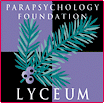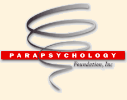 |
 |
| Carlos S. Alvarado, Ph.D. If you decide to do a thesis or a dissertation on a parapsychological topic it is advisable to try to include a non-parapsychological aspect as well. By this I mean more than studying the relationship of, say, ESP to attitudes or religiosity. If possible, it is recommended that you have data that will contribute as well to other areas, even if you do not report all the findings in your thesis or dissertation. I did this in my own graduate work at the University of Edinburgh. My Ph.D. was on psychological correlates of out- of-body experiences (OBEs). In one of my studies I conducted analyses to relate OBEs to dissociative experiences, as measured by a well-known instrument, the Dissociative Experiences Scale. But I also collected data that allowed me to explore whether dissociation scores were related to vivid and lucid dreams, and dream recall frequency. I later published three papers in a psychology journal with a colleague using this data, two about the dream variables and one about the dissociation scale. Having data you can analyze and then publish in another discipline may increase your chances of getting a job because it will indicate to prospective employers that you are interested in, and have the necessary skills to work in, other topics areas in psychology. In addition, you may contribute as well to other areas of knowledge. |
 |

|
 www. parapsychology. org |
||